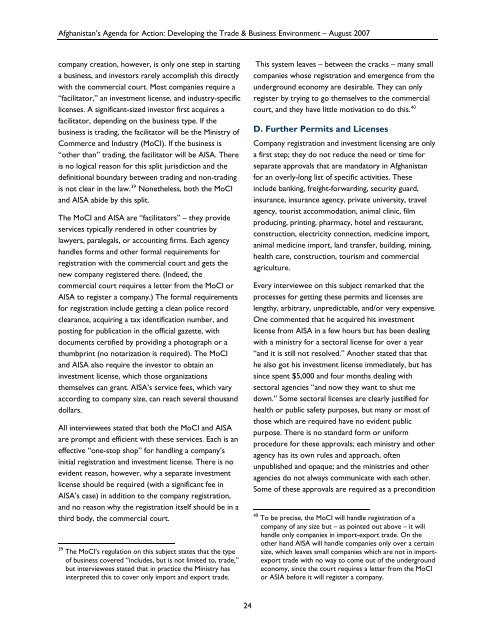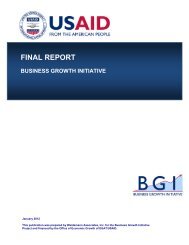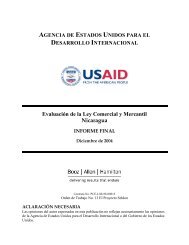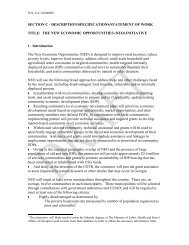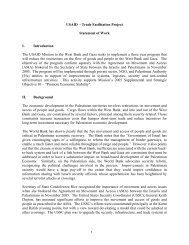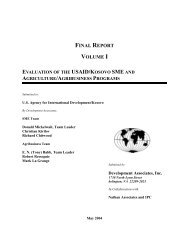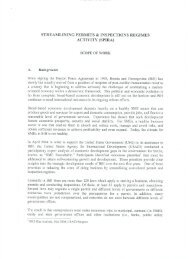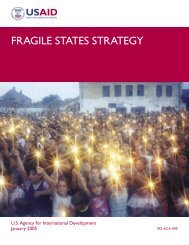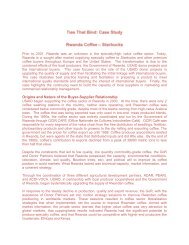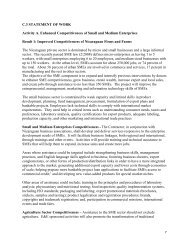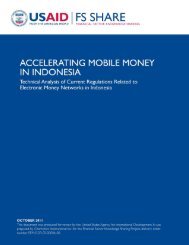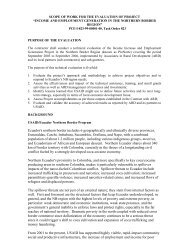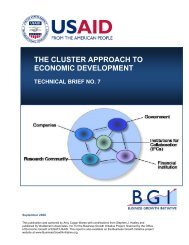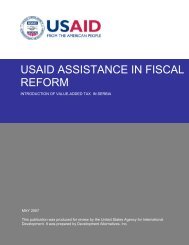Afghanistan's Agenda for Action - Economic Growth - usaid
Afghanistan's Agenda for Action - Economic Growth - usaid
Afghanistan's Agenda for Action - Economic Growth - usaid
You also want an ePaper? Increase the reach of your titles
YUMPU automatically turns print PDFs into web optimized ePapers that Google loves.
Afghanistan’s <strong>Agenda</strong> <strong>for</strong> <strong>Action</strong>: Developing the Trade & Business Environment – August 2007company creation, however, is only one step in startinga business, and investors rarely accomplish this directlywith the commercial court. Most companies require a“facilitator,” an investment license, and industry-specificlicenses. A significant-sized investor first acquires afacilitator, depending on the business type. If thebusiness is trading, the facilitator will be the Ministry ofCommerce and Industry (MoCI). If the business is“other than” trading, the facilitator will be AISA. Thereis no logical reason <strong>for</strong> this split jurisdiction and thedefinitional boundary between trading and non-tradingis not clear in the law. 39 Nonetheless, both the MoCIand AISA abide by this split.The MoCI and AISA are “facilitators” – they provideservices typically rendered in other countries bylawyers, paralegals, or accounting firms. Each agencyhandles <strong>for</strong>ms and other <strong>for</strong>mal requirements <strong>for</strong>registration with the commercial court and gets thenew company registered there. (Indeed, thecommercial court requires a letter from the MoCI orAISA to register a company.) The <strong>for</strong>mal requirements<strong>for</strong> registration include getting a clean police recordclearance, acquiring a tax identification number, andposting <strong>for</strong> publication in the official gazette, withdocuments certified by providing a photograph or athumbprint (no notarization is required). The MoCIand AISA also require the investor to obtain aninvestment license, which those organizationsthemselves can grant. AISA’s service fees, which varyaccording to company size, can reach several thousanddollars.All interviewees stated that both the MoCI and AISAare prompt and efficient with these services. Each is aneffective “one-stop shop” <strong>for</strong> handling a company’sinitial registration and investment license. There is noevident reason, however, why a separate investmentlicense should be required (with a significant fee inAISA’s case) in addition to the company registration,and no reason why the registration itself should be in athird body, the commercial court.39 The MoCI’s regulation on this subject states that the typeof business covered “includes, but is not limited to, trade,”but interviewees stated that in practice the Ministry hasinterpreted this to cover only import and export trade.This system leaves – between the cracks – many smallcompanies whose registration and emergence from theunderground economy are desirable. They can onlyregister by trying to go themselves to the commercialcourt, and they have little motivation to do this. 40D. Further Permits and LicensesCompany registration and investment licensing are onlya first step; they do not reduce the need or time <strong>for</strong>separate approvals that are mandatory in Afghanistan<strong>for</strong> an overly-long list of specific activities. Theseinclude banking, freight-<strong>for</strong>warding, security guard,insurance, insurance agency, private university, travelagency, tourist accommodation, animal clinic, filmproducing, printing, pharmacy, hotel and restaurant,construction, electricity connection, medicine import,animal medicine import, land transfer, building, mining,health care, construction, tourism and commercialagriculture.Every interviewee on this subject remarked that theprocesses <strong>for</strong> getting these permits and licenses arelengthy, arbitrary, unpredictable, and/or very expensive.One commented that he acquired his investmentlicense from AISA in a few hours but has been dealingwith a ministry <strong>for</strong> a sectoral license <strong>for</strong> over a year“and it is still not resolved.” Another stated that thathe also got his investment license immediately, but hassince spent $5,000 and four months dealing withsectoral agencies “and now they want to shut medown.” Some sectoral licenses are clearly justified <strong>for</strong>health or public safety purposes, but many or most ofthose which are required have no evident publicpurpose. There is no standard <strong>for</strong>m or uni<strong>for</strong>mprocedure <strong>for</strong> these approvals; each ministry and otheragency has its own rules and approach, oftenunpublished and opaque; and the ministries and otheragencies do not always communicate with each other.Some of these approvals are required as a precondition40 To be precise, the MoCI will handle registration of acompany of any size but – as pointed out above – it willhandle only companies in import-export trade. On theother hand AISA will handle companies only over a certainsize, which leaves small companies which are not in importexporttrade with no way to come out of the undergroundeconomy, since the court requires a letter from the MoCIor ASIA be<strong>for</strong>e it will register a company.24


